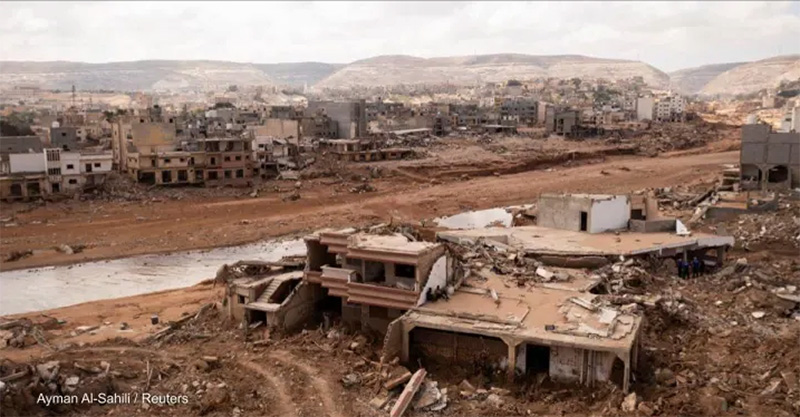
Nearly three months have passed since two dams on Libya’s Wadi Derna river collapsed during Storm Daniel. On Sept. 11, rampaging floodwaters engulfed the coastal city of Derna, washing thousands of people out to sea.
As of Nov. 14, the death toll stands at 4,352 and more than 8,000 people are missing, according to the U.N. Office for the Coordination of Humanitarian Affairs, or UNOCHA. A further 44,800 are internally displaced. These people still face myriad problems, including a lack of basic needs such as shelter and clean water. There have been nearly 10,000 cases of diarrhea. Psychological distress among children is highly reported.
But the world has long since moved on, especially with war raging in Gaza. And even though we’re in the midst of the United Nations Climate Change Conference — and these types of floods are a classic sign of the increasing ferocity of storms due to a warming planet — Libya is now just one of many climate change-exacerbated disasters that barely receive fleeting mentions.
In the wake of the largely forgotten tragedy, Devex spoke to Dr. Alaa Murabit, a Libyan-Canadian who is director of global programs, advocacy, and communications at the Bill & Melinda Gates Foundation and United Nations high-level commissioner on health employment and economic growth. She is also a medical doctor, global security strategist, and women’s rights defender.
Murabit expressed disappointment at the global community and local government’s responses to the disaster. She urged development professionals to accept that such disasters are becoming habitual, and build more resilience to cope with them.
This conversation has been edited for length and clarity.
Usually, at the start of something like this, everybody parachutes in. That's where the bulk of support comes in. In Libya, that hasn’t happened.
Marry that to the fact that months later, people are experiencing very basic challenges in sanitation and accommodation — things that should have been resolved.
Because there have been humanitarian aid organizations in Libya for some time, because of the ebbs and flows of conflict, I expected them to be more equipped, engaged, and prepared to deal with this. But the time it took them to respond, the level of engagement, and the level of resourcing, was pretty stark.
From the international community at large, very few prominent media houses made significant stories on Libya. Very few elected officials spoke up. Those feel small, but they are actually pretty significant. They tell you the level of political or media attention and weight being given.
I was also surprised, and continue to be, that many global health organizations did not talk about what the aftermath looks like. It is time for humanitarian and health organizations to more clearly articulate the kinds of protracted health conditions, diseases, and deaths that come from events like this. Floods and cyclones are going to become more common [as a result of climate change].
The fourth point is education organizations. Local leaders speak so much about the power of education and maintaining routines for children. If they are left out of school for too long, it’s absolutely detrimental. I am thrown by how clear that is to local leaders, communities, parents, and families, and how little global development professionals then invest in resources and amplify that message.
Global development professionals tend to try to resolve the crisis, then deal with all the other pieces. And you can't. If crisis after crisis has taught us anything, you need to try to resolve the security and logistical realities while you also ensure kids stay in school, pregnant women can access birthing facilities, and people have potable water and clothes. That is an effective crisis response.
I’m sure it accomplished certain political goals. But what did it actually change for the people impacted by the floods? That answer is unclear. It is important people recognize participation cannot be divorced from rebuilding. The community that has been impacted has to sit at the table. The idea you're going to get sustainable, effective solutions for people impacted based on solely a political elite, or a room of people with influence and power for societal, gendered, or military reasons, is absurd.
It reminds you how chronic crisis is and how bad we are at responding, not just in Libya, but anywhere. Pick any conflict or a climate crisis. Pakistan and Mozambique had a cyclone a year ago, and they're still going through it.
We frame it like it's this acute thing. But more often than not, it's chronic. These sorts of situations need persistent support, resourcing, and attention. In a world where attention is very hard to get, and resourcing near impossible, it makes you feel paralyzed.
On the other hand, what is more promising is people from the community who lead and do things they've never done before. Overnight they become sanitation experts, education experts — whatever they need to do.
This has reaffirmed my belief that the people most impacted by something are those who will create the solutions. There's a huge role for the international community, but that role might be different. There has to be a response to crises in the way they are lived — a chronic response.
I do not want to under-emphasize how resilient Libyan communities have been. It is humbling to see people who lose everything still ask, ‘What else can we do for others?’ I wish our politicians had a semblance of that. In almost every kind of situation, the resilience of people is rarely matched by the capability, intentionality, honesty, or integrity of a governing body.